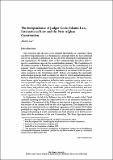| dc.description.abstract |
Reseña: The conviction that the rule of law depends existentially on a judiciary whichcan deliver impartial justice is so fundamental a principle that it has been enshrinednot just in domestic constitutions but has also been endorsed by international lawand organisations. All member states of the Commonwealth provide in their respectiveconstitutions expressly for an independent judiciary1. The Constitution ofthe Islamic Republic of Pakistan, for instance, provides for the establishment of ajudiciary which is independent from the other two branches of government2 andwhose judges can only be removed or disciplined in accordance with the procedurescontained in the Constitution itself3. Debates surrounding this universallyacknowledged principle tend to examine the extent to which judicial independencehas been implemented in actual constitutional and legal practice. All major internationalhuman rights’ organisations include in their respective country reports a sectionon judicial independence and even a cursory engagement with the topic revealsthat there is little doubt that in many countries the gap between constitutionaltheory and political reality is considerable. Judicial accountability and measuresto combat instances of corruption have now made their way onto the agendaof a number of fora including the Commonwealth and prominent non-governmentalorganisations like Transparency International.The conviction that the rule of law depends existentially on a judiciary which can deliver impartial justice is so fundamental a principle that it has been enshrined not just in domestic constitutions but has also been endorsed by international law and organisations. All member states of the Commonwealth provide in their respective constitutions expressly for an independent judiciary. The Constitution ofthe Islamic Republic of Pakistan, for instance, provides for the establishment of ajudiciary which is independent from the other two branches of government andwhose judges can only be removed or disciplined in accordance with the procedurescontained in the Constitution itself. Debates surrounding this universallyacknowledged principle tend to examine the extent to which judicial independencehas been implemented in actual constitutional and legal practice. All major internationalhuman rights’ organisations include in their respective country reports a sectionon judicial independence and even a cursory engagement with the topic revealsthat there is little doubt that in many countries the gap between constitutionaltheory and political reality is considerable. Judicial accountability and measuresto combat instances of corruption have now made their way onto the agendaof a number of fora including the Commonwealth and prominent non-governmentalorganisations like Transparency International... The Afghan judiciary will have an important role to play in reconciling the at times differing demands of Islam and international human rights law since, in accordance with Article 121, the Supreme Court upon request of the Government or the Courts can review compliance with the Constitution of laws, legislative decrees, international treaties, and international conventions, and interpret them, in accordance with the law. Given that all laws in Afghanistan have to be in accordance with Islam the Supreme Court has considerable power in the shaping of the legal system. Conversely, the more powerful a court is the more tempting is it to manipulate its judges. Thus, the issue of judicial independence is inextricably linked to that of judicial accountability and supervision. This article explores the issues of both judicial independence from the perspective of Islamic and international law before moving to the legal system of Afghanistan itself. |

